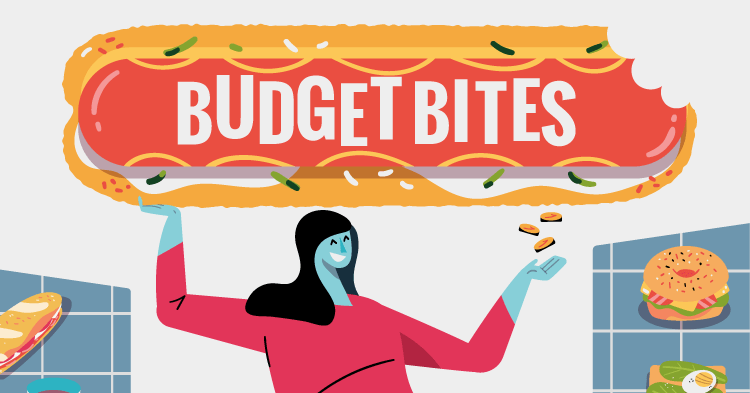Soft skills are often thought of as a person’s innate personality traits, modes of thought and people skills. But while that is true to an extent, it is possible and advisable to improve your soft skills to flourish in your career.
These skills can help you get ahead when job hunting and lay the foundations for a prosperous and meaningful career. Soft skills make you not just more employable but more keep-able. As the BBC reports, the labor shortage has organizations thinking more about long-term hires: “employees who have the interpersonal skills and emotional intelligence to grow into leadership positions offer a lot more value.”
The job market is likely to continue developing in this direction. The World Economic Forum’s Future of Jobs Report notes that,
“emerging technologies such as generative AI are reshaping workforce demands, and employers are placing greater emphasis on “soft” skills. These skills allow companies to respond to change and are resistant to automation. Early evidence suggests that the supply side of the market is equalising itself: socio-emotional skills have steadily increased their share of learning hours from 2017 to 2023.”
One of the main benefits of soft skills is that, unlike technical skills, they are applicable in nearly any workplace and across industries. But that doesn’t mean they have the same value on every job application or location. So, to identify the most valuable soft skills around the U.S., Neighborhood Trust focused on job ads for the best-paid roles in every state and five major cities.
What We Did
We analyzed publicly available data from Indeed.com to assess the demand for soft skills among U.S. job ads. Focusing only on roles in the top 25% wage bracket, we identified the most desirable soft skill in each state, the top five states for each skill and the five most desired soft skills in New York City, Los Angeles, Chicago, San Francisco and Austin.
Key Findings
- The most in-demand soft skill is strategic thinking, which appears in 64.77% of ads for highly paid jobs.
- Active listening is the most desired soft skill in Louisiana, New York and Texas.
- The most wanted soft skills in New York City are strategic thinking (68.21% of job ads), presentation skills (55.06%) and negotiation (51.82%).
- In Los Angeles, the most in-demand soft skills for top jobs are strategic thinking (69.08%), persuasion (62.16%) and negotiation (60.85%).
The Most Valuable Soft Skills in the United States
First, we looked at the U.S. in general to see which soft skills are most in demand on average among the highest-paid jobs. We identified four soft skills that crop up in over half of all job ads with high pay: strategic thinking, negotiation, persuasion and presentation skills. Strategic thinking is the stand-out winner, in demand for nearly two-thirds of high-paid jobs.
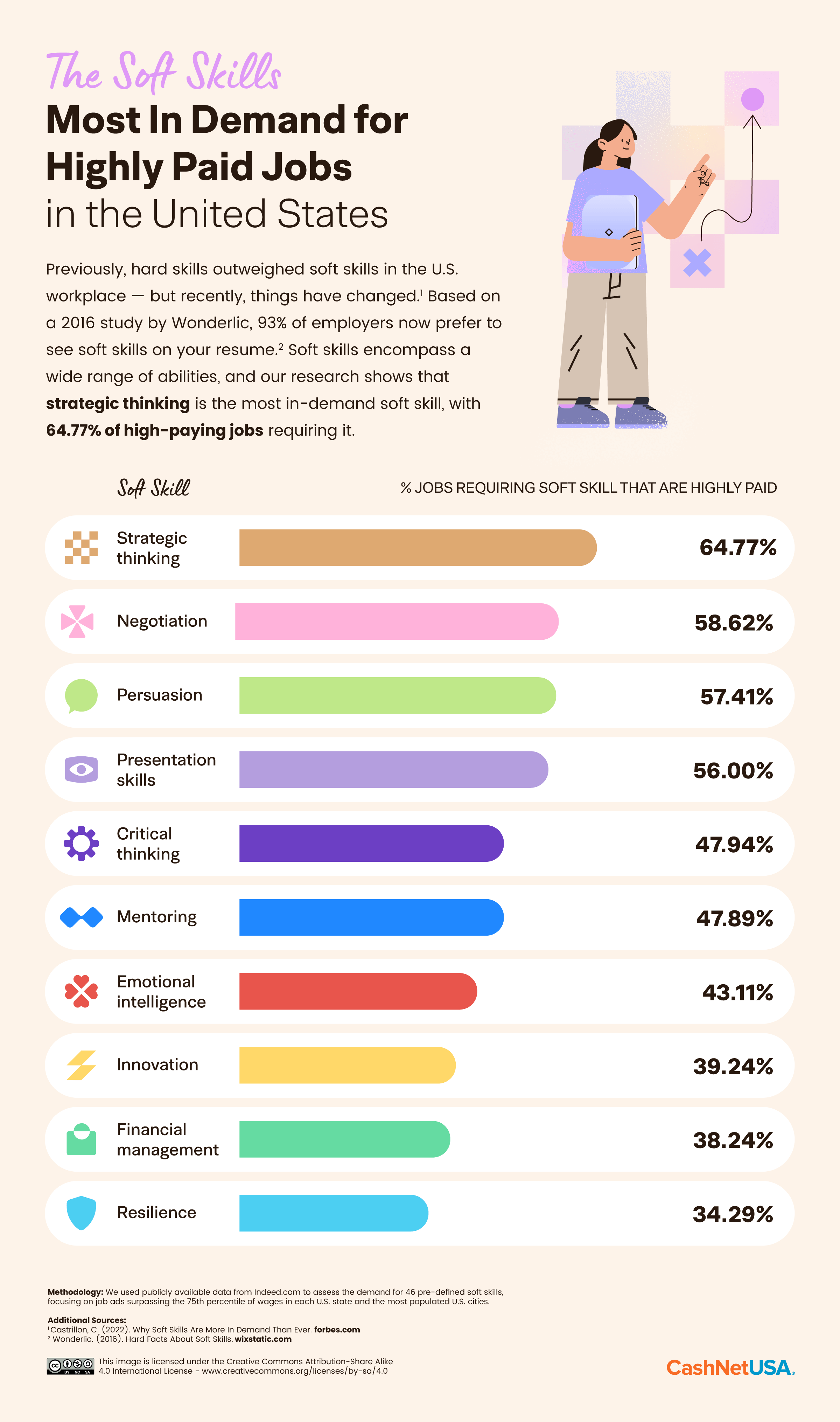
Click here to see the image in full size
Why is strategic thinking such a highly valued soft skill? For one thing, strategic thinking in the top echelons of a company feeds into how that company is steered. A strategic thinker combines various soft skills, including analysis, problem-solving and planning to guide operational and developmental decision-making. They help shape the company’s mission and vision. A role that demands strategic thinking will likely require you to be vocal and adaptable concerning your informed opinions.
Next, we looked at which soft skills are most disproportionately popular in each state among employers trying to fill high-paid roles. “Disproportionately popular” means that these soft skills are sought at a higher rate in a given state as compared to the national average — which is why strategic thinking doesn’t feature, despite it being the most sought-after soft skill in general.
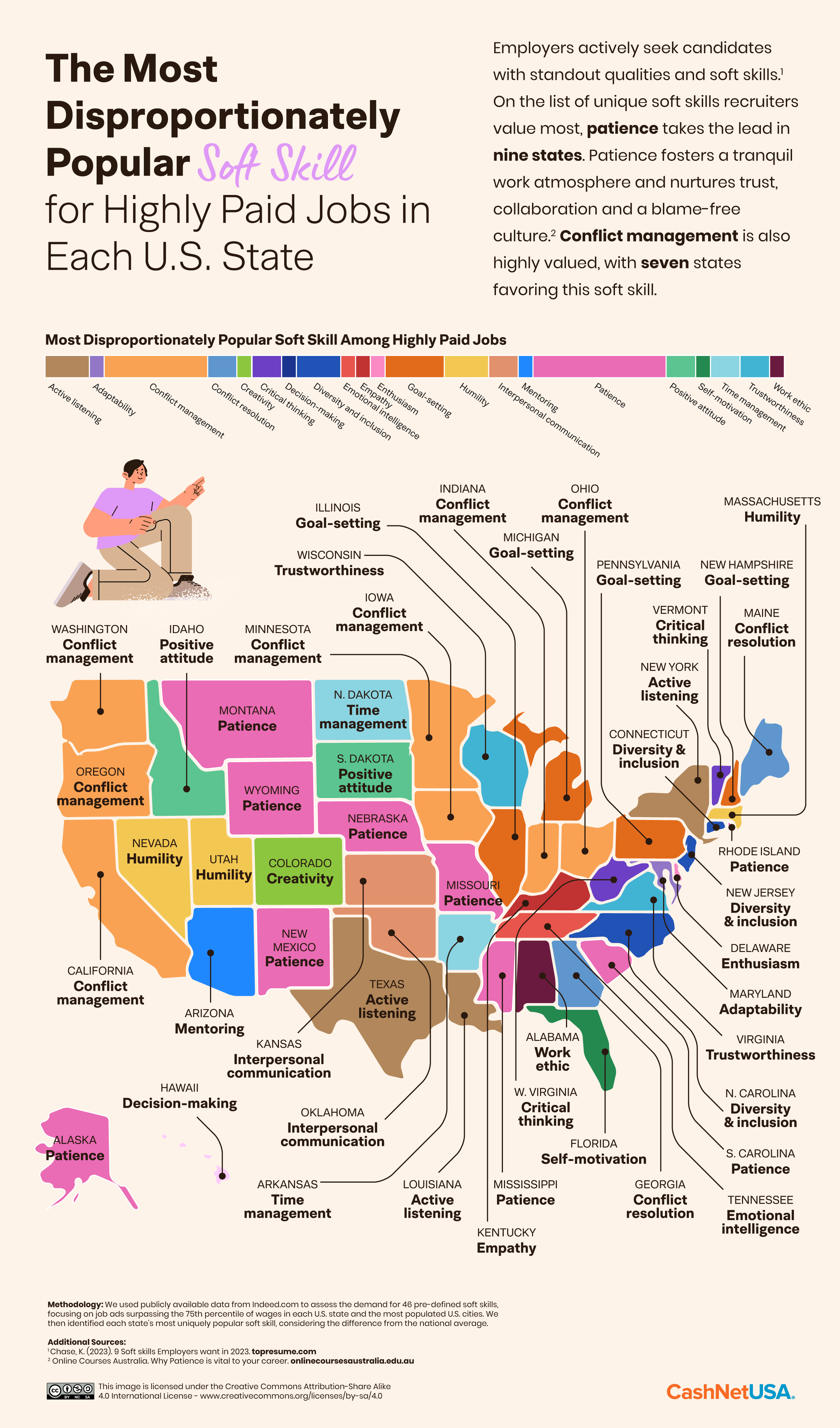
Click here to see the image in full size
As the above map shows, Nevada and Utah maintain a pocket of humility in the West. Just under three-quarters of high-paid job ads in these states list humility among the desirable soft skills. (Massachusetts also has humility as its top trait, but it is required in just 63.21% of relevant job ads.)
Humility is having the strength and confidence to admit when you’re wrong or that there’s something you don’t know. Fast Company recently called humility “the most important leadership trait.” Genuine humility wins trust among colleagues. It suggests the flexibility to change plans and defer power or glory when it’s in the company’s best interests.
Next, we flipped things to see in which five states each of the top ten soft skills are most valued. We found that strategic thinking, America’s most sought-after soft skill for highly paid jobs, is most in demand in Mississippi, with 85.51% of top job ads listing it. However, that figure also reaches the low 70s in Nevada, South Carolina, Utah and California.
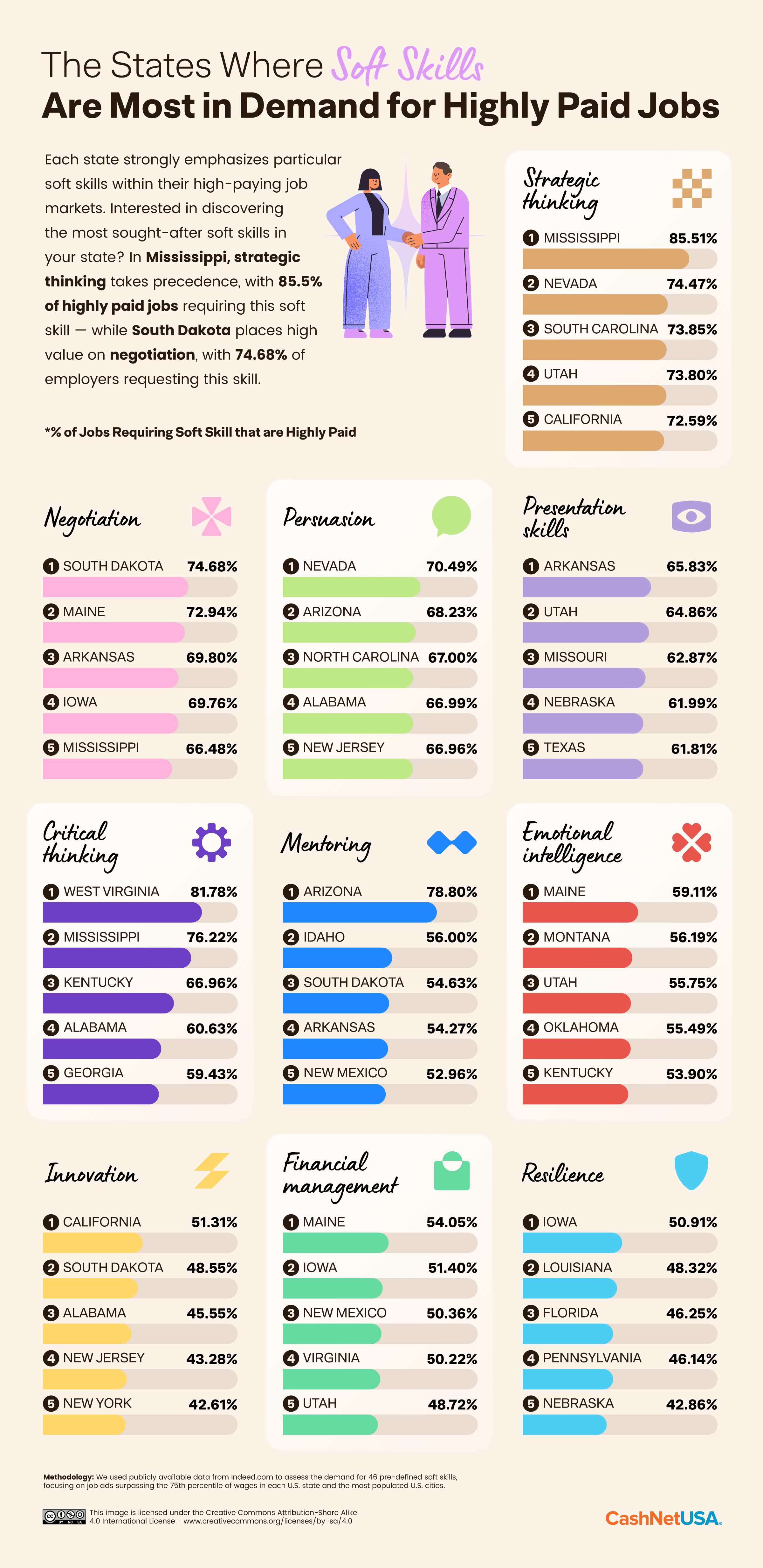
Click here to see the image in full size
The soft skills in the highest demand in each state may be due to regional pressures or opportunities, the nature of local businesses or local culture and character. Most of these groupings are geographically disparate, but the five states that most value critical thinking are all in the rural south. These states are among those with the lowest college attendance rates; since critical thinking has been shown to “improve substantially over a normal college experience,” it is possible that these skills are harder to identify locally compared to the soft skills for which the region is noted.
The Soft Skills Most in Demand for Highly Paid Jobs in New York City
New York City’s work culture is direct and competitive, which may seem to preclude the importance of soft skills. But in such an environment, emotional intelligence and people skills can be more valuable than ever. “I try not to call them soft skills,” says New York City recruiter Laura Mazzullo, “because I think they’re some of the hardest and most necessary life skills.”
These two extremes meet in the middle with presentation skills and negotiation, which are NYC’s second and third most sought-after soft skills. These skill types benefit from high levels of self-awareness and confidence as well as an ability to listen and put oneself in the other’s shoes.
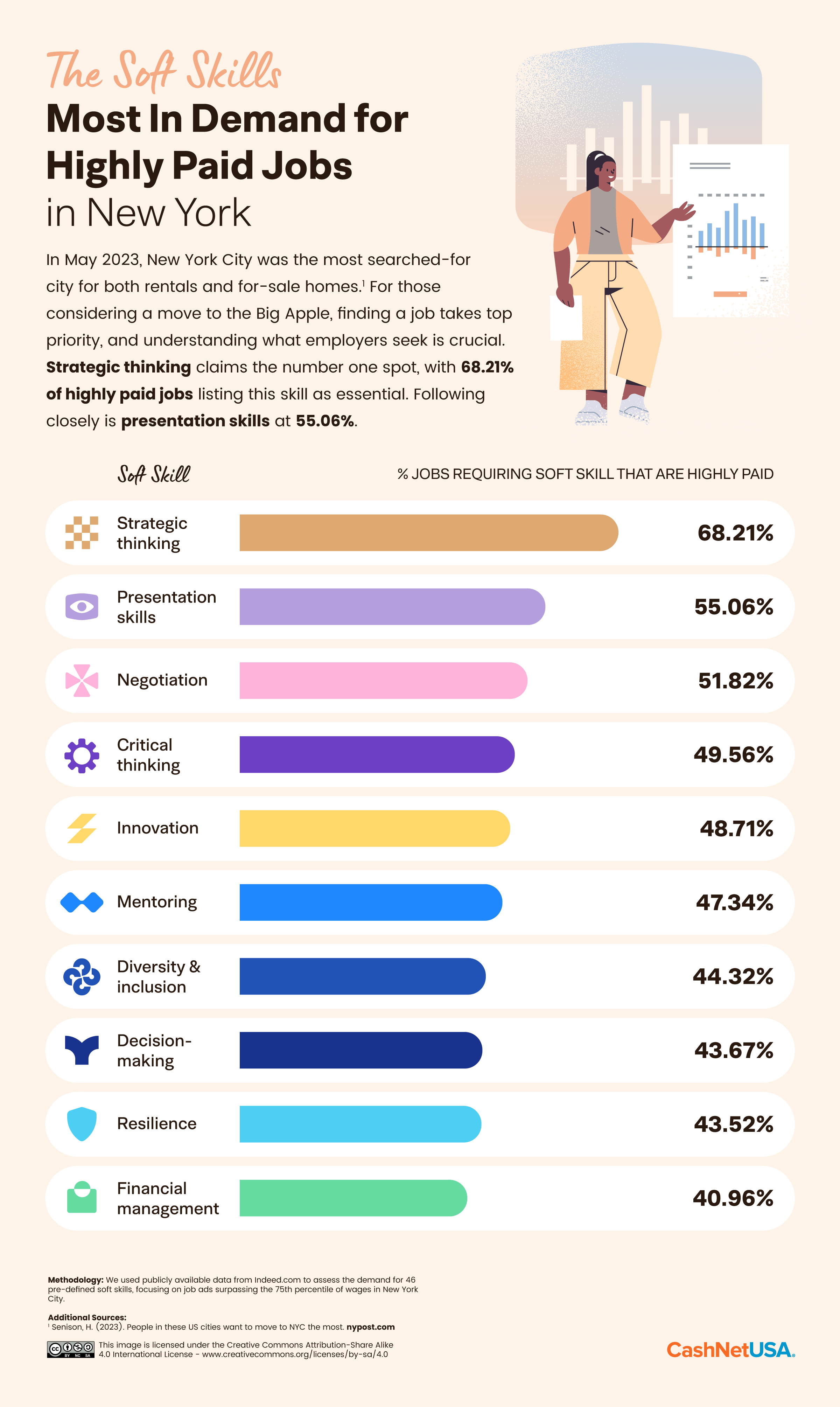
Click here to see the image in full size
Ultimately, in such a competitive realm, an applicant’s personal traits and strengths may give them the edge. “It’s not like when you’re hiring an engineer, you specifically need this type of software or system experience,” continues Mazzullo. “A lot of times, we are thinking about what qualities they’re bringing into an organization.”
The Soft Skills Most in Demand for Highly Paid Jobs in Los Angeles
Our study shows that persuasion is the second most sought-after soft skill in L.A., followed by negotiation. As a cultural and creative capital, Los Angeles is a city where stories must be told before they are sold. The business and entertainment industries are competitive markets where intuitive, charismatic storytellers can make the difference in million-dollar deals. From the elevator pitch to the virtual presentation, high-paid professionals benefit from the ability to structure their stories and adapt them to the audience and time slot; we found that presentation skills are the fourth most valuable soft skills in the city.
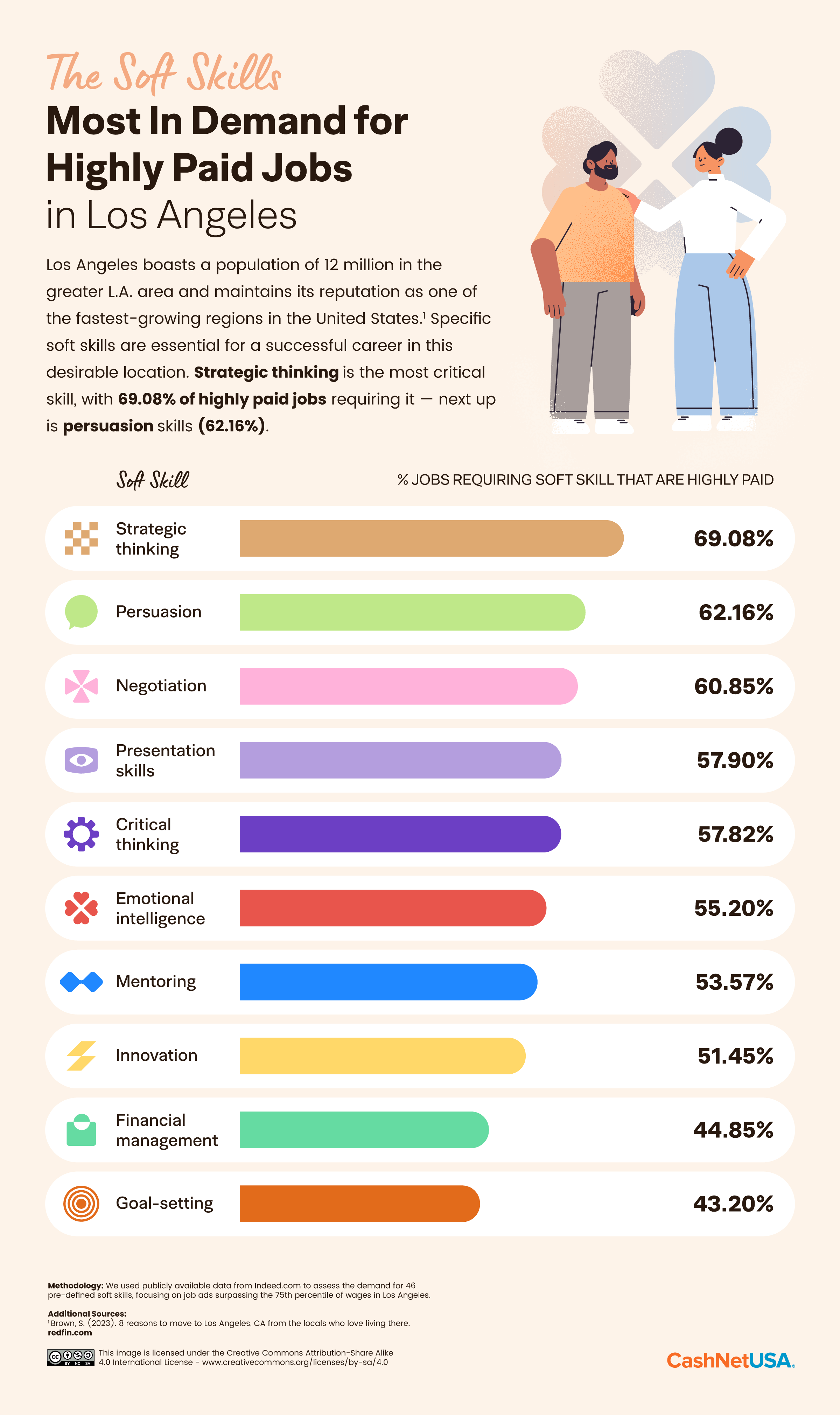
Click here to see the image in full size
Los Angeles has had an interesting role model for presentation skills lately: record-breaking Los Angeles Rams receiver Puka Nacua. Recognized for his positivity and charm in interviews and his team work on the field, Nacua has mastered a level of self-awareness that enables him to switch ‘modes’ as appropriate to the situation.
Nacua “talks in grunts on game day,” says Cooper Kupp. “When he gets to the sidelines, he takes probably 10 seconds to just stand there stoically and not say anything like he’s in a different world. So you just kind of got to wait for him to get out of that place and then he kind of comes back to earth.”
The Soft Skills Most in Demand for Highly Paid Jobs in Chicago
Persuasion is a powerful trait in Chicago, too. Over 71% of highly paid jobs require it, making it the city’s most valuable soft skill. Academic studies suggest that persuasion may account for 25-30% of GDP. “Nothing happens voluntarily in an economy, or a society, unless someone changes her mind,” explains Deirdre McCloskey at Chicago’s University of Illinois. “Behavior can be changed by compulsion, but minds cannot.”
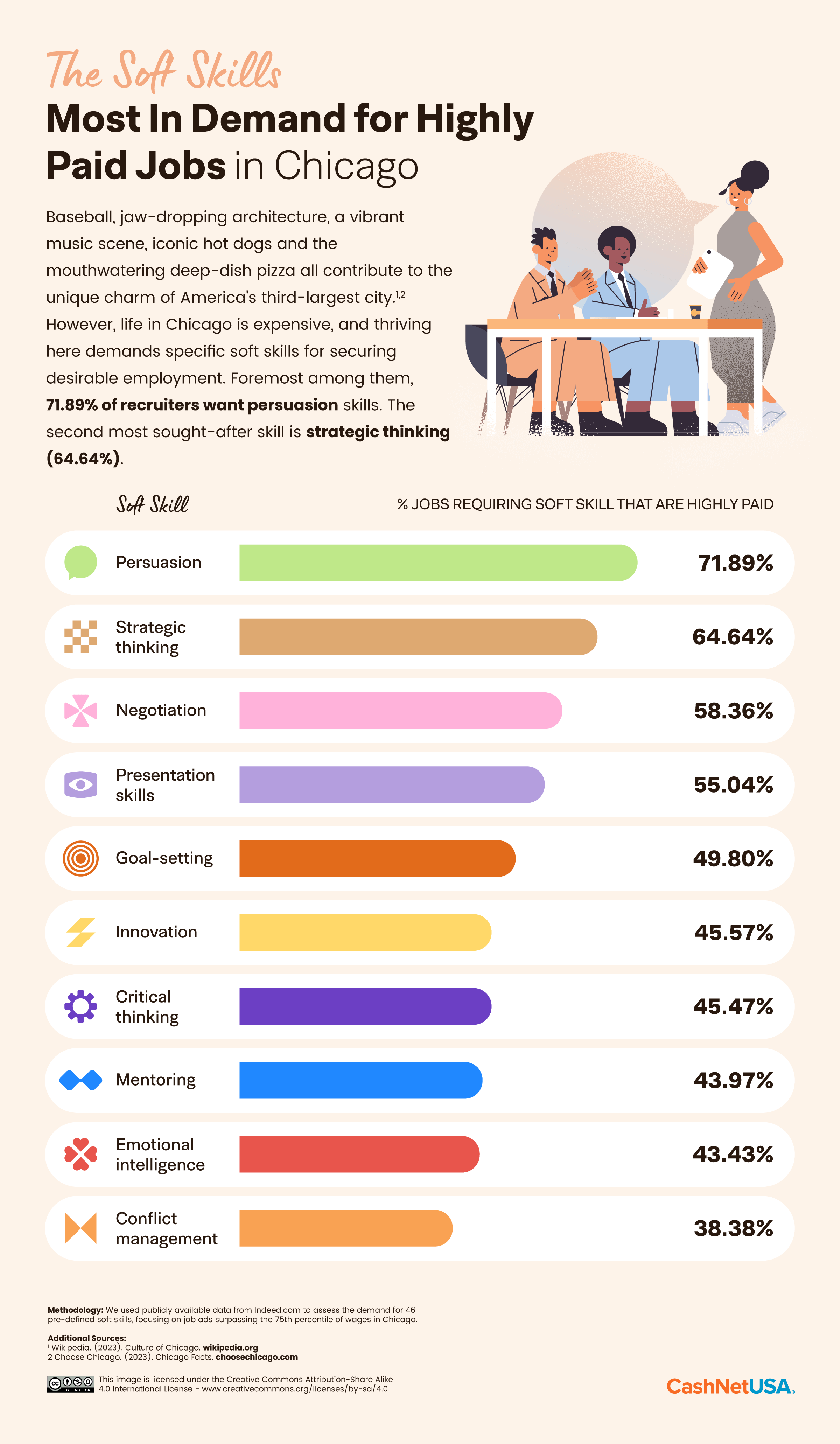
Click here to see the image in full size
Persuasion is a communication skill that requires elements of storytelling, presentation and empathy. Its status as a soft skill is up for debate, as there is also an ancient and ever-evolving science of convincing others of your point. Aristotle may have been the first to break this formula down into parts: character, reason, emotion, metaphor and brevity.
The Soft Skills Most in Demand for Highly Paid Jobs in San Francisco
San Francisco is the “world’s preeminent hub for technology,” and its employers rank innovation as the fourth most valuable soft skill. Innovation is a skill that straddles the divide between “soft” and “hard” skills, and in the tech sector, innovation can be even more valuable than hard tech skills.
“[W]hen we were trying to expand our ability to hire more women into technical jobs, says Accenture CEO Julie Sweet, “because we can do so much training, we actually have gone to, for example, liberal arts schools and hired in more people with great critical thinking skills, really good soft skills, and then train them on the technology. I certainly think that soft skills are absolutely critical, and they’re an important part of the interviewing process.”
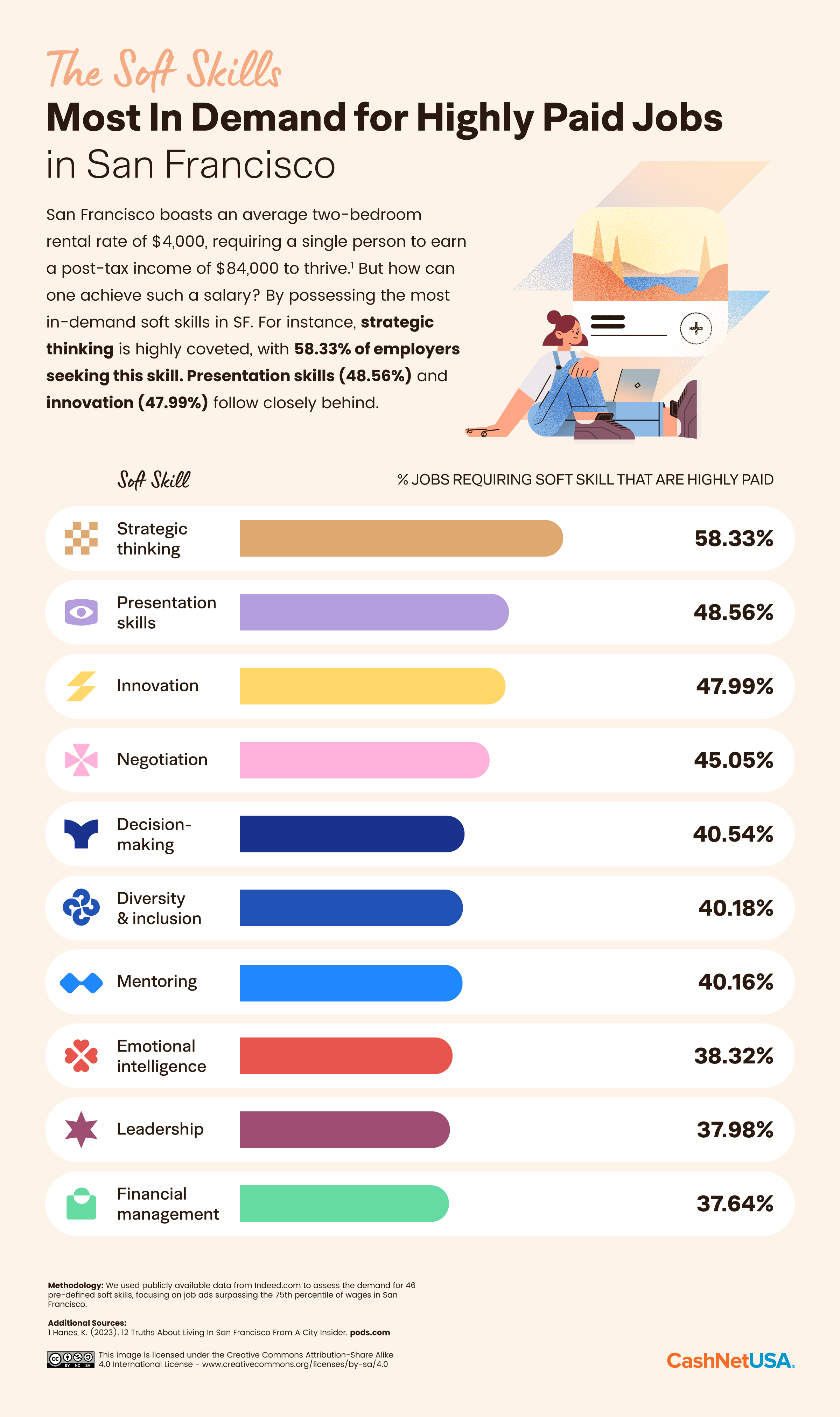
Click here to see the image in full size
The trait of being innovative is critical not just as a working mindset but as a cultural one. For example, satellite development firm Planet fosters innovation through a “people-first culture,” according to Senior Director of Customer Success Jen Gussman, and the company “innovates through our mission-based activities and culture. We are literally making change in the world around us, and that’s deeply ingrained in our communal sense of self.”
The Soft Skills Most in Demand for Highly Paid Jobs in Austin
Over half of the highly paid job ads in Austin, Texas, list emotional intelligence as a desirable soft skill. And yet the phrase remains mysterious to many, having only emerged in the 1990s.
“Emotional Intelligence (EI) is the ability to manage both your own emotions and understand the emotions of people around you,” explains Mental Health America, listing the five key elements as self-awareness, self-regulation, motivation, empathy and social skills.
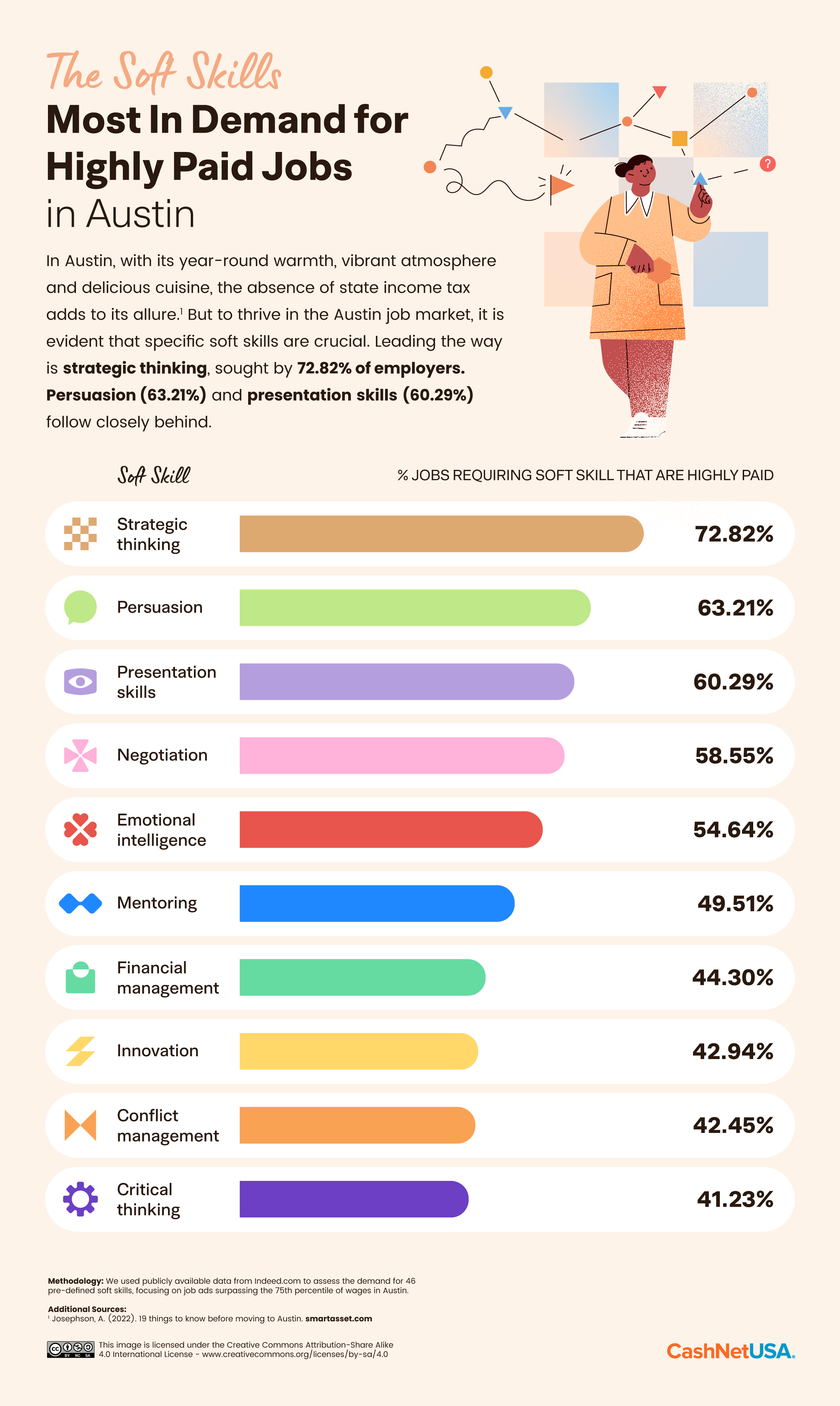
Click here to see the image in full size
Emotional intelligence is particularly critical in leadership roles. But, since the skill involves a high degree of self-knowledge, and since our emotional life can become ingrained during childhood, it is difficult to accurately assess one’s own strengths in this area.
“Even people with many apparent leadership strengths can stand to better understand those areas of EI where we have room to grow,” insists Daniel Goleman, whose 1995 bestseller Emotional Intelligence brought the concept to the mainstream. “Don’t shortchange your development as a leader by assuming that EI is all about being sweet and chipper, or that your EI is perfect.”
How to Develop Your Soft Skills
When applying for a job, it makes sense to highlight and demonstrate your soft skills at the point of application — particularly those the employer mentioned.
However, soft skills benefit from ongoing appraisal and development. And your first real test will be at the interview stage. So, you can begin by assessing your soft skills and developing them today. Here are some simple steps you can take.
- Know thyself. It’s not always easy to gauge your own soft skills, so use an assessment tool like Skills Base to get an objective view.
- Research your key areas. When you’ve highlighted four or five soft skills to prioritize, read up on them to better understand what each entails.
- Take a course. All sorts of different organizations offer general soft skills courses, and some offer more specific training for particular skill areas. If you are unemployed, your local careers advisor may be able to help; if you are working, take advantage of professional development opportunities as they arise.
- Practice your skills. Consider joining a club or doing volunteer work to flex your soft-skill muscles. For example, volunteering in the community can develop empathy and problem-solving skills, while joining a sports team may help boost your resilience and communication skills.
- Remain open to feedback. Humility is a soft skill in itself — and having the humility to listen to feedback can help you identify new areas for growth.
Although soft skills are taught to some degree at school, the system does not prioritize them in the same way as more obviously “profitable” skills. The U.S. Chamber of Commerce reports that “[d]espite U.S. high school graduation rates reaching all-time highs, many employers are finding that recent graduates are unprepared to succeed in the workforce because they lack foundational ‘soft skills’” — which goes to show that developing these skills on your own time may give you the competitive edge.
On average, soft skills are not as well rewarded as hard technical skills in terms of starting salary. But high-paying firms do expect applicants to demonstrate strengths in this area, recognizing that a team with strong people skills is a happier team and that happier organizations achieve “more profit, higher productivity, more innovation and creativity, greater customer loyalty,” according to the University of Maryland’s Project Management Center for Excellence.
Happier, more creative and better set for the long haul: your soft skills are more robust than the “softness” implies.
The Methodology Behind This Study
To discover the soft skills most in demand among highly paid U.S. jobs, we uncovered the proportion of jobs advertising for particular soft skills in the top 75th percentile of salary brackets for each U.S. state and the most populated U.S. cities.
Using Indeed.com’s job listings, we separately searched the number of jobs advertised per location from a seed list of 46 soft skills and the number of jobs advertised at or above the 75th percentile of local average earnings for the same seed list of soft skills.
This allowed us to calculate which soft skills were most in demand per location based on having the highest percentage of job ads per skill at or above the 75th percentile of wages.
We also revealed the most uniquely popular soft skill for each U.S. state. This is based on a soft skill with the highest difference in its percentage of job ads that are highly paid vs. the national average percentage of highly paid jobs for that soft skill.
Our final analysis considers more than 17 million job ads on Indeed.com in the United States. Salary percentiles were sourced from the Bureau of Labor Statistics, with cities represented by their wider metro area values.
The analysis of this data is correct as of November 2023.
Additional Sources
Castrillon, C. (2022). Why Soft Skills Are More In Demand Than Ever. forbes.com
Wonderlic. (2016). Hard Facts About Soft Skills. docs.wixstatic.com
Chase, K. (2023). 9 Soft skills Employers want in 2023. topresume.com
Online Courses Australia. (n.d.). Why Patience is vital to your career. onlinecoursesaustralia.edu.au
Senison, H. (2023). People in these US cities want to move to NYC the most. nypost.com
Brown, S. (2023). 8 reasons to move to Los Angeles, CA from the locals who love living there. redfin.com
Wikipedia. (2023). Culture of Chicago. wikipedia.org
Choose Chicago. (2023). Chicago Facts. choosechicago.com
Hanes, K. (2023). 12 Truths About Living In San Francisco From A City Insider. pods.com

